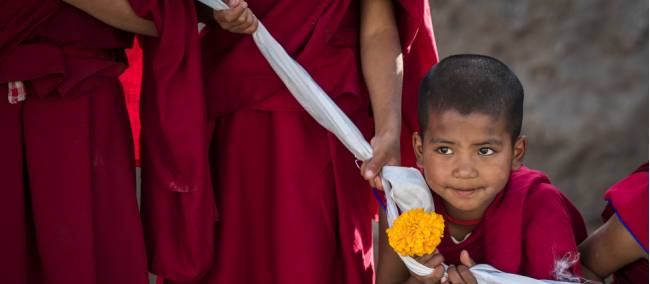
Novice monk at Tikse Monastery | Richard I'Anson
Blog home / Defending Cultural Diversity through Adventure Travel
With the increase of well dressed and nourished Western travellers to so many remote and delicate destinations it’s no surprise that many that live in these places feel some pressure to conform. We want to change the narrative.
World Expeditions has been operating BIG adventures with a small footprint in over 120 countries since 1975, and over this time we’ve been highly conscious of the need to respectfully engage with international communities around the globe, encourage cultural preservation and cooperate on programs that will provide long lasting benefits for the host communities.
WHAT IS MONOCULTURALISM?
A big word, with bigger consequences. Monoculturalism is a policy or process of supporting or advocating a single social or ethnic group, in most cases, this stems from a strong belief of superiority by one group.
In some of the world’s most traditional communities such as Peru, Kenya and Nepal, the younger generation and in particular, males, are embracing Western values as the ideal. If they continue to lean in to this, over many future generations we run the real risk of becoming a monoculture.
At a recent trade event, our CEO, Sue Badyari, spoke as a panellist in a crowded room of travel industry professionals.
“It’s a really important issue today in tourism that we must lean into these cultures and tell them that they should be the pinup for Western culture, not the other way around. We do not want the world to become a monoculture”.
But why? Well, traditionally, monoculture has lead to the suppression and subsequent loss of ethnic cultures across the globe. It has also contributed to many of the genocides practiced throughout history.
HOW DO WE STOP IT?
We (travel companies and our travellers collectively) need to all be part of the solution to encourage cultural pride and its preservation as the poster for global diversity.
Traditional cultures should be the pin up for where Western values can learn from. Changing the narrative that traditional cultures should not aspire to Western values in order to progress is not only important but an imperative.
In many countries, like Australia, we are experiencing a period of Indigenous awareness like never before.
Travellers are eager to understand and learn from the Indigenous communities who have been the custodians of their country for a very long time.
We saw this as an intrinsic opportunity for our travellers to learn from a long time ago and subsequently wove into our programs the inclusion of wonderful people who are the traditional custodians and who provide travellers with valuable insights into their cultural beliefs and learnings. Our travellers rank this element very highly in the score of their overall travel experience.
When you travel, we have some practical suggestions for travellers aimed at fostering not only a harmonious and positive travel experience for them, but ensuring the local community are encouraged and engaged also by their presence. Part of our job is to draw on our long experience and educate and set the right expectations. Here are some examples of how we achieve that:
- Providing travellers with an overview of the history, traditions and customs of the destinations they are visiting, helping them to understand what is and what isn’t appropriate.
- Relying on the resourceful suggestions from our local tour guides in how to respect local customs and traditions while abroad which may include dress codes, taking photos of local people and any other significant cultural nuances.
- Recommending wearing modest clothing to encourage respectful interactions. In Muslim countries that is additionally important, and in countries such as Iran, some clothing items such as a head scarf for women are essential.
- Advocating for an open and positive mindset whilst travelling. People from across the globe have so many different perspectives and travellers can learn a lot if they listen and learn from other cultures.
- Buy locally made products, support local artisans which in turn helps the local economies.
- Be particularly mindful when in spiritual places, temples or places of worship.
- Learning a few key words and phrases of the local language before you visit, it’s shows you’ve made an effort to immerse interactively with the people of the destination and they always appreciate that.